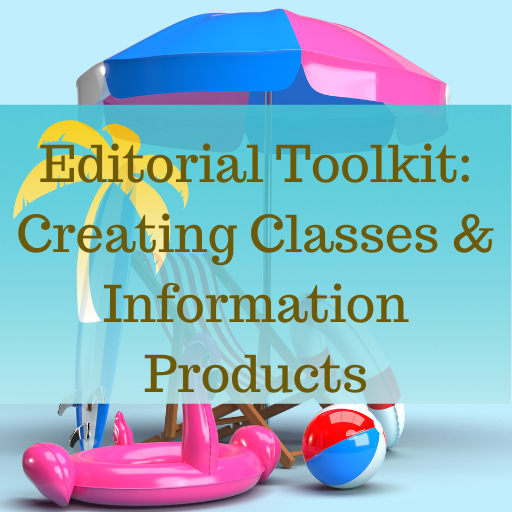Using information products to boost your bottom line
People like to pretend that you can write a book and make passive income from it.
You can’t.

If you write a book and stick it up on Amazon and never do anything to promote or market it, you’re not going to sell any copies. Okay, you might sell three or four to people who have accidentally stumbled onto it but twelve dollars in royalties hardly repays how long it takes to write a book (even a short book).
So I’m not going to say that you can make money while you sleep!!! by writing a book. But I do think ebooks (and similar information products, like a white paper or collection of templates) can help improve your bottom line.
A couple of years ago I wrote The Club Ed Guide to Running a Profitable Freelance Editing Business because the #1 question I get asked is some form of “So, how do you run a profitable freelance editing business?” And instead of answering this question over and over or (more often) not answering this question at all, I just started sending people the link.
I had written about running a freelance business for my blog and for other reasons, so while writing the book certainly took time, it wasn’t as if I started from scratch. I took all of the previously written material and piled it together and shaped it into a coherent narrative. It took probably four weeks of fairly focused effort, plus some time revising after a few beta readers got their hands on it.
I don’t do a lot to market this book, though you can find it on the Club Ed website, and as a result, I don’t make a ton of money in royalties from it. But it has boosted my bottom line considerably because people who read the book take my classes. And that is where I make most of my income.
If someone has heard of Club Ed, but they’re not sure they want to take a class, they can buy the book for ten bucks and find out if they think I have anything to say that they want to listen to. It’s a minimal investment, but once they’ve made it, they’re highly likely to purchase a class from me.
If you’re trying to book more editing clients, some kind of information product (doesn’t have to be a book) that requires a small financial investment on the client’s part can convert more potential clients into actual clients. It gives them a chance to get to know your approach and to decide whether they trust you before they spring for a bigger-ticket item.
Other Helpful Content
-
Exploring versus Judging Character
One of the curious conundrums I’ve experienced as a book editor is encountering characters that the author clearly has contempt for but expects readers to be interested in engaging with. Contempt is as poisonous in writing as it is in relationships. The goal of the author should not be to judge character but to explore
-
Coaching Opportunities with Potential Clients
I think of coaching as anything that helps a writer write their book, improve their book, sell their book, or otherwise advance their writing career but which isn’t a straightforward edit on a complete manuscript. In other words, if I help an author write a query letter, or brainstorm solutions to plot problems, or review
-
Coaching and Editing Discovery Drafts
Discovery drafts are typically the first draft of a novel that an author uses to explore the story they’re writing, whether the story has been prompted by a situation, a setting, a character, or a theme. The discovery draft typically includes stops and starts, directions the story could take but doesn’t, characters that fade in
Join the Club!
New to story editing? Begin at the beginning.


